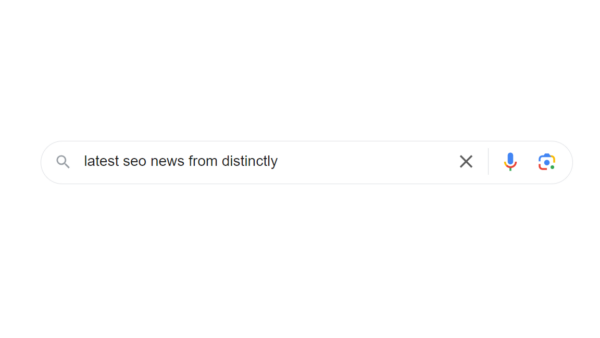Organic Search News Round Up – March 2025
We’ve compiled the essential updates from Google and the broader world of search from March – keeping you up to date with everything you need to know.
Covering:
- What Content Works Well in LLMs?
- Google vs ChatGPT Usage: A Reality Check?
- The Role of Social Media and Brand in Modern SEO
- The INMA AI Report & What It Means for Digital PR in 2025
- Google’s New AI Mode
- The Rise of Publisher-Led Studies – and Why It Matters for PR
- Easier Google Review Links with QR Codes
- Reddit’s New AI-Generated Content: The /klp/ Subfolder
- March 2025 Core Update – Completed
- The Changing Face of E-commerce SERPs – and Why Video Matters
- AI Overviews Now Live in Parts of Europe
- Stay Ahead in SEO with Distinctly
What Content Works Well in LLMs?
Recent research by Kevin Indig delves into the types of content that receive citations and mentions from AI chatbots like ChatGPT and Perplexity. The study analysed over 7,000 citations across 1,600 URLs to identify patterns in content that LLMs favour.
Key findings:
- Depth and comprehensiveness: LLMs prefer content that is in-depth and comprehensive. The analysis revealed that factors such as word count, sentence count, and readability significantly influence the likelihood of content being cited by AI chatbots. For instance, the top 10% of cited pages had notably higher word and sentence counts compared to the bottom 90%.
- Classic SEO metrics are less relevant: Traditional SEO metrics like domain rating and backlink profiles were found to have minimal impact on LLM citations. This is interesting as this is the first study I have seen which suggests this; most seem to find positive correlations between these metrics and AI visibility.
- Brand popularity matters: The study also found a correlation between brand search volume and the frequency of brand mentions in AI chatbot responses. Popular brands with higher search volumes are more likely to be referenced by LLMs, indicating that brand awareness plays a role in AI visibility. This leads us to question how we can influence this more as digital marketers; by amplifying key brand content and people to sources where their customers hang out.
Implications for content strategy:
Focus on comprehensive content: To increase the likelihood of being cited by LLMs, content creators should aim to produce thorough and well-researched articles that cover topics in detail.
The following examples all demonstrate those qualities, according to Kevin:
- https://www.byrdie.com/digital-prescription-services-dermatologist-5179537
- https://www.healthline.com/nutrition/best-weight-loss-programs
https://www.verywellmind.com/we-tried-online-therapy-com-these-were-our-experiences-8780086
For me, it’s simple: offer something different to what already exists, and make sure your own opinion and expertise come through. Standing out is no longer optional – every brand needs a clear point of difference.
As AI continues to shape search and content consumption, understanding these dynamics can help marketers and content creators adapt their strategies to maintain and strengthen their online presence.
Google vs ChatGPT Usage: A Reality Check?
There’s been no shortage of hype around AI tools (including from this monthly blog), and usage is certainly growing fast. But it’s important to put that growth into perspective before completely rethinking search strategies.
Really interesting new data from SparkToro was published last month and reveals just how vast the gap still is between traditional search engines and AI tools when it comes to volume and market share. There are lots of caveats and guestimations, but, in 2024:
- Google handled 14 billion searches per day
- And grew 20% year on year
- ChatGPT managed around 37.5 million ‘search equivalents’ daily
- Google Search receives ~373x as many searches than Chan GPT
- Bing, Yahoo, and DuckDuckGo also far outpace LLM usage
Even when combining all major AI tools, their total estimated share of the search market sits under 2%. Google, meanwhile, commands over 93% of global search activity based on this data.


So what does this mean for marketers?
Simply, don’t put all your eggs in the AI basket at the expense of Google. There are clear and obvious benefits to being referenced by ChatGPT and other LLMs – brand visibility, recognition, and customer attribution being the key three – and we absolutely want our clients to be featured there. But AI Chat is still a small part of the overall search landscape.
If you want to grow visibility, ranking on Google remains the priority. That means continuing to invest in technical SEO, quality, unique and expert-led, experience-driven content, and brand-building that supports your presence across all the digital touchpoints LLMs and users alike draw from. While ChatGPT gets the attention, Google still gets the clicks.
However, if you do all of that well, you’ll give yourself a great chance of being featured in LLM platforms too.
I liked this from Rand Fishkin below:


The Role of Social Media and Brand in Modern SEO
Today in Search, being a recognisable and trusted brand has never been more important. Whether it’s a consumer scanning the SERPs or an AI model deciding what to surface, known entities win.
People are more likely to buy from businesses they’re aware of – and if they aren’t already familiar, they need clear signs that the business is legitimate and trustworthy. That’s where social media plays a vital role.
An active and engaged presence across platforms like LinkedIn, Instagram, TikTok and YouTube doesn’t just boost visibility – it signals authenticity. Social channels give you space to show how you interact with customers, respond to feedback and handle service. They’re also a great way to amplify:
- Reviews and testimonials
- PR coverage or thought leadership
- Results and case studies
These signals matter to potential customers – and they’re not lost on Google or AI systems either.
In 2025, search doesn’t live in just one place. People are “searching” on LinkedIn, Reddit, TikTok, YouTube and AI tools like ChatGPT – and they’re acting on what they find there. Visibility now goes well beyond your website.
That’s why at Distinctly, we’ve started rolling out Social Performance Audits for our clients, helping them understand:
- How they’re performing on each channel
- What platforms are sending the most traffic
- Where competitors are investing in paid and organic social
- Which content formats drive the highest engagement
- Where the untapped opportunities lie
If you’re only focusing on Google rankings, you’re missing part of the picture. Brand visibility now depends on showing up across all the places your audience already spends time.


From this, a tailored strategy can take shape – aligning your SEO, content, brand and social goals to maximise visibility and trust across every digital touchpoint.
Distinctly client? Your Account Manager will be speaking with you about this soon.
Not a client but like the sound of this? Reach out – we’d love to chat.
The INMA AI Report & What It Means for Digital PR in 2025
In March, the International News Media Association (INMA) released its latest report: How News Organisations Should Work With AI Companies. While focused on publishers, it contains plenty for digital PRs to pay attention to.
The report explores how AI is reshaping journalism, from content creation to editorial workflows – and the implications are clear: the lines between media, AI and PR are getting blurrier.
Key takeaways:
- Nearly 40% of publishers are now using AI to support writing, research and data analysis
- Stories backed by solid data and clear sources are more likely to be picked up, used by AI models, or even surfaced in AI-generated summaries
- Digital PR campaigns should factor in format as well as content – structured data, concise summaries, and clear expert commentary will help your story be understood and surfaced
In short, it’s not just about landing coverage anymore – it’s about making sure your content is recognisable and reusable in an AI-driven media landscape.
Google’s New AI Mode
Google is currently testing a new feature called AI Mode – and while it’s not available in the UK yet, it’s worth understanding what it is and how it differs from what we’re already seeing.
So, what’s the difference between AI Overviews and AI Mode?
- AI Overviews are already live in the UK and many other markets. They appear at the top of some results and provide AI-generated summaries in addition to traditional links.
- AI Mode, on the other hand, is being tested in the US only (for now), and it’s a much bigger shift. Instead of showing AI Overviews alongside normal results, AI Mode puts the AI-generated response front and centre – replacing the usual link-based layout entirely.
In short, AI Overviews supplement search, but AI Mode could eventually replace it – at least for some queries. Here’s what it looks like:

Source – https://x.com/BritneyMuller/status/1902409411030634620/photo/1
Why this matters
AI Overviews are already becoming more common than many people realise. A recent analysis of over 150,000 search queries by Mark Williams-Cook found that almost 80% of logged-in users saw an AIO in their results. That’s not a small feature anymore – it’s central to how Google is presenting information.
So while AI Mode isn’t live in the UK yet, we’re already in an AI-influenced search landscape. These features are shifting how visibility works.
Some may see AI Mode as the next step towards a fully AI-led search experience. Others will see it as just another evolution – one of many changes search has gone through over the years.
If the past two years have shown us anything, it’s that these shifts tend to follow a familiar pattern: a big launch, lots of noise, a period of adjustment, and then slower adoption as the rest of the world catches up – sometimes with excitement, sometimes with pushback.
My prediction? More of the same. The pace of change will continue to feel fast, but the true impact will unfold more gradually, giving us time to observe, adapt, and make smarter decisions along the way. As always, the TechRadar comment section offers an early glimpse into how some are reacting… and it’s not exactly glowing.
The Rise of Publisher-Led Studies – and Why It Matters for PR
A trend we’ve noticed over recent months is the growing number of publications creating and sharing their own digital studies. While this started with AI-generated visual content (think ‘imagined as…’ articles), it’s now shifting toward more meaningful, data-led editorial.
Publishers are commissioning surveys, running proprietary research and sharing original insights – often with the aim of becoming a cited source in AI-driven platforms and tools.
This is important for digital PR teams. As LLMs continue to rely on high-quality, verifiable information, original research and data-backed storytelling will become even more valuable. Not just for landing coverage, but for feeding the very systems shaping how that content is found.
For brands, it’s a cue to think beyond commentary and reactive newsjacking – and start building owned data assets that help shape the conversation.
Easier Google Review Links with QR Codes
Google has quietly rolled out a helpful little update for local businesses. You can now generate a QR code directly from your Google Business Profile that links users straight to your review form.
This makes it easier to collect reviews in person, in print, or across offline touchpoints – and reduces the friction that normally comes with asking customers to find your profile themselves.
To generate your QR code:
- Log into your Google Business Profile
- Look for the “Get more reviews” section
- Click to generate and download your QR code
It’s a small feature, but a useful one. You can drop the QR code onto flyers, receipts, thank-you cards, shop signage, packaging inserts – anywhere your customers might scan and leave a review while the experience is fresh.
We all know how valuable reviews are for local visibility and trust. Making it easier for people to leave one is always a good move.
Reddit’s New AI-Generated Content: The /klp/ Subfolder
Reddit appears to be testing a new subfolder, /klp/, which compiles top posts on specific topics. The content seems to be generated or curated by AI and is clearly optimised around ‘best [topic]’ keywords.
For example, the page best pub quiz questions pulls together high-performing threads related to that theme. In my view, it’s a great user experience – clear, concise and focused on what people actually want.
It’s still early days for this feature, and we don’t yet know how far Reddit plans to take it. But visibility is growing quickly, and it fits into a wider trend: giving users what they are looking for without expecting them to dig for it.
There’s a lesson here for businesses too. If you have customer reviews, case studies or feedback scattered across different pages or platforms, do not wait for users to hunt it all down. Create your own master hubs that pull everything together in one place. It shows off your strengths and makes it easier for potential customers to take action.
March 2025 Core Update – Completed
Google’s March 2025 core update finished rolling out on 27 March, taking just under two weeks from start to finish.
As with recent core updates, the aim was to improve the quality and relevance of results. Early observations suggest some forum-heavy and thin content pages saw drops, while well-established, trusted sites gained visibility. It’s a familiar pattern by now.
Nothing majorly unexpected – but if you noticed ranking movement in mid-to-late March, this will likely be the reason.
The Changing Face of E-commerce SERPs – and Why Video Matters
At Distinctly, we’ve been digging into the current makeup of e-commerce search results – and one stat in particular stood out.
From a 90,000 keyword sample, we found that just 8% of e-commerce searches featured video content on the SERP. That might sound low, but it was one of the most surprising findings from our dataset.
Why? Because video often gets overlooked in e-commerce strategies. But this data shows it’s still being pulled into SERPs in a meaningful way and we know from experience that when video is present, it draws attention.
More importantly, it’s a reminder that YouTube remains a huge discovery channel. There are thousands of customers each month searching there for information, reviews and comparisons related to your products or category. If you’re not active, your competitors might be.
We’ll be releasing more of this data and analysis of other key features soon, all drawn from our own proprietary tool – stay tuned.

AI Overviews Now Live in Parts of Europe
Google has expanded AI Overviews to nine more countries across Europe, including Germany, Spain, Italy, Ireland and others.
If you’ve got clients or business interests in these markets, it’s worth keeping an eye on how this affects visibility and traffic – especially for top-of-funnel, informational content.
Stay Ahead in SEO with Distinctly
Enjoyed our March roundup? Stay updated with the latest Organic trends, tips, and exclusive insights by subscribing to our newsletter.



